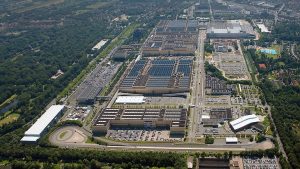 Mercedes-Benz Cars announced that from the beginning of the year all its vehicle components for passenger cars will be transported only using railway services.
Mercedes-Benz Cars announced that from the beginning of the year all its vehicle components for passenger cars will be transported only using railway services.
This applies for the Mercedes-Benz plants in Bremen, Rastatt, Sindelfingen, Hamburg, Kuppenheim, Untertürkheim and MDC Power GmbH in Kölleda, Germany, as well as for the plant in Kecskemét, Hungary. The project is carried out in partnership with Deutsche Bahn.
The company has been continuously expanding its use of the rail network in particular and has been focusing on sustainable and digital innovations. Mercedes-Benz intends to use the railway transport for at least 30 plants.
“The reduction of CO₂ is one of our central areas of activity, and one which we are systematically addressing at our more than 30 plants and in our logistics. Our objective is to achieve a more sustainable and eco-friendly transport mix across our entire global logistics network. The conversion to CO₂-free rail transport is a very important step in this respect”, said Jörg Burzer, Member of the Board of Management of Mercedes-Benz AG.
The project is part of company’s strategy towards CO₂-neutral mobility, as by using railway transport services that removes 270 truck-loads a day off roads. The components will be transported in Germany and Austria by railways as the two countries are using green energy coming from domestic renewable energy sources. A majority of the green energy is currently produced at hydro-electric power stations.
“The focus of our logistics concepts is on CO₂ emissions, as well as costs, duration and transport quality. When selecting our logistics service providers, sustainability is an important criterion and this can range from using eco-friendly equipment to deploying low-emission trucks in accordance with the latest European norm or using alternative drive technologies”, Elke Pußkeiler, the Head of Supply Chain Management at Mercedes-Benz Cars said.
As part of the “Ambition2039” initiative, Mercedes-Benz Cars has set comprehensive objectives for climate protection which includes the production of fully CO₂-neutral new vehicle fleet by 2039. By 2030 more than half of its vehicles on the road are scheduled to have an electric drive system, that includes all-electric passenger cars and plug-in hybrids.
Share on:



